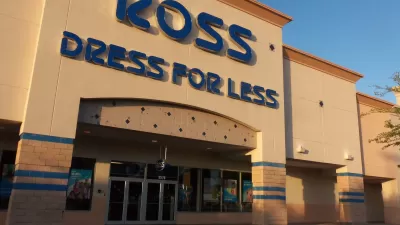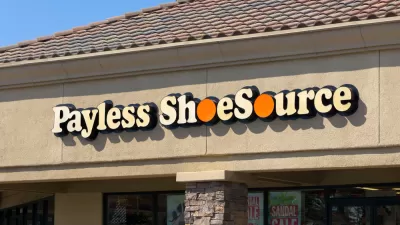Farhad Manjoo probes the internet retail giant's shifting strategy on the geographic distribution of its facilities, and wonders what the implications are for local retail once Amazon can offer same-day delivery.
For years Amazon fought efforts by states to collect sales taxes from its customers, relying on shipping goods from distribution centers located in "faraway, low-cost
states" to customers in "more populous, high-cost states" to skirt tax laws. But in recent years, the company has stopped fighting the sales-tax war and will soon be collecting taxes from the majority of its customers.
Why the shift you ask? "Now that it has agreed to collect
sales taxes," writes Manjoo, "the company can legally set up warehouses right inside some
of the largest metropolitan areas in the nation." And with hundred of millions of dollars invested in new facilities in New Jersey, Virginia, Texas, Tennessee, Indiana, and California, Amazon seems to be doing just that, in an ambitious effort to achieve the ultimate in speedy service - same day delivery.
"It's hard to overstate how thoroughly this move will shake up the retail
industry," says Manjoo. "Same-day delivery has long been the holy grail of Internet
retailers, something that dozens of startups have tried and failed to
accomplish. (Remember Kozmo.com?) But Amazon is investing billions to make next-day delivery standard, and same-day
delivery an option for lots of customers. If it can pull that off, the
company will permanently alter how we shop. To put it more bluntly:
Physical retailers will be hosed."
And the next logical question would be, what happens to our commercial districts with physical retailers under increased pressure? Will our shopping districts become home to endless storefronts of automated "lockers"? Will self-driving cars deliver our packages of diapers directly to our offices?
FULL STORY: I Want It Today

Planetizen Federal Action Tracker
A weekly monitor of how Trump’s orders and actions are impacting planners and planning in America.

Chicago’s Ghost Rails
Just beneath the surface of the modern city lie the remnants of its expansive early 20th-century streetcar system.

San Antonio and Austin are Fusing Into one Massive Megaregion
The region spanning the two central Texas cities is growing fast, posing challenges for local infrastructure and water supplies.

Since Zion's Shuttles Went Electric “The Smog is Gone”
Visitors to Zion National Park can enjoy the canyon via the nation’s first fully electric park shuttle system.

Trump Distributing DOT Safety Funds at 1/10 Rate of Biden
Funds for Safe Streets and other transportation safety and equity programs are being held up by administrative reviews and conflicts with the Trump administration’s priorities.

German Cities Subsidize Taxis for Women Amid Wave of Violence
Free or low-cost taxi rides can help women navigate cities more safely, but critics say the programs don't address the root causes of violence against women.
Urban Design for Planners 1: Software Tools
This six-course series explores essential urban design concepts using open source software and equips planners with the tools they need to participate fully in the urban design process.
Planning for Universal Design
Learn the tools for implementing Universal Design in planning regulations.
planning NEXT
Appalachian Highlands Housing Partners
Mpact (founded as Rail~Volution)
City of Camden Redevelopment Agency
City of Astoria
City of Portland
City of Laramie





























